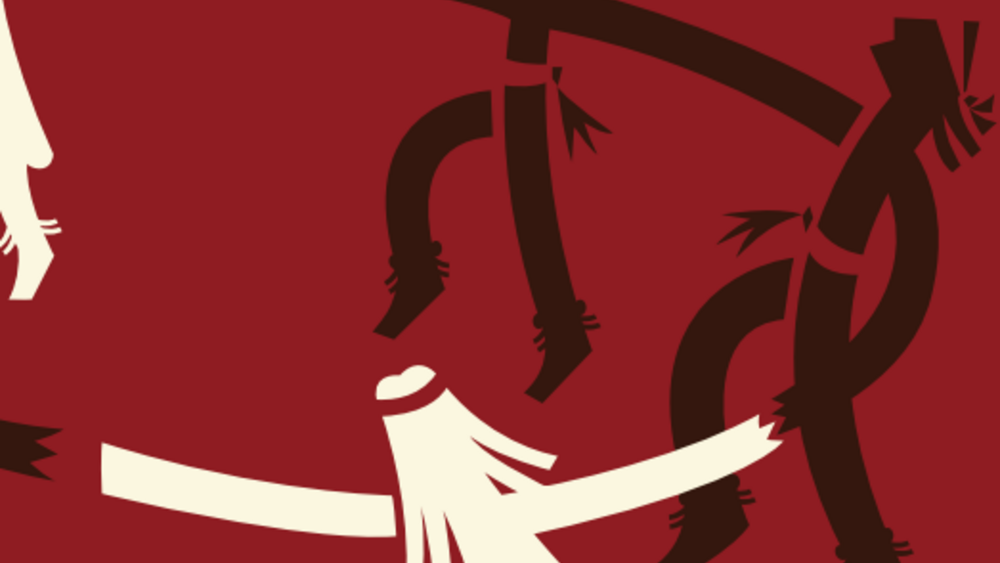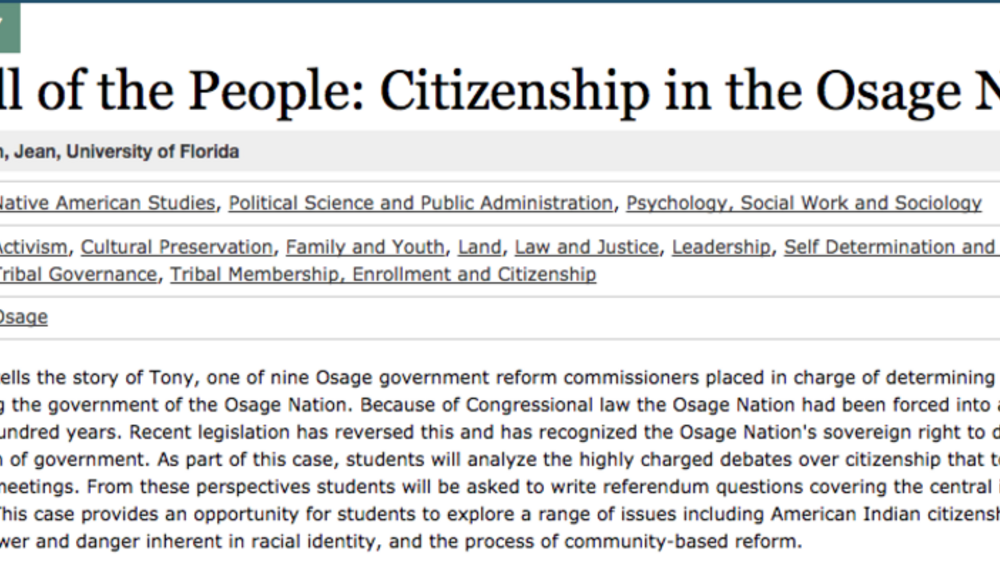Native Leaders and scholars discuss the pervasive role that terminology plays in conceptions of Native nation sovereignty and citizenship, comparing and contrasting the terms "member" and "citizen" and discussing the origins of the term "member" in Native nations' definitions of who is to be considered part of them.
Additional Information
Goldberg, Carole. "Designing Tribal Citizenship." Tribal Constitutions seminar. Native Nations Institute for Leadership, Management, and Policy, University of Arizona. Tucson, Arizona. April 3, 2013. Presentation.
Tatum, Melissa L. "Constitutions and Constitutional Reform - Day 2 (Q&A)." Tribal Constitutions seminar. Native Nations Institute for Leadership, Management, and Policy, University of Arizona. Tucson, Arizona. April 4, 2013. Q&A session.
Timeche, Joan. "The Process of Constitutional Reform: Key Issues and Cases to Consider." Tribal Constitutions seminar. Native Nations Institute for Leadership, Management, and Policy, University of Arizona. Tucson, Arizona. May 2, 2012. Presentation.
Transcript
Carole Goldberg:
“You’ve often seen the word 'membership' used in lieu of 'citizenship.' The term 'membership' harkens back to something that Chairman Rocky Barrett of Citizen Potawatomi said in one of the earlier presentations you saw here today. There was in the development of tribal constitutions through the Indian Reorganization Act of 1934 a view of tribes as, in some respects, corporate entities that would have boards and members. There was also a view of tribes as something akin to private associations or even clubs that would have members. The terminology of 'citizenship' evokes sovereignty and nationhood. I think it’s become more common for Native nations to use the terminology of 'citizenship,' but any constitution has to have, as you heard earlier, the legitimacy and acceptance of the people whose government it is and the terminology will have to fit comfortably for whatever community that is.”
Melissa L. Tatum:
“Tribes need to consciously claim the language of sovereignty when they’re reforming their government, and that means using separation of powers if it’s appropriate, if it’s a cultural fit, adopting some other means of allocating responsibility and government functions depending on the tribe. But it also means being conscious of how certain words and phrases are viewed by other governments. For example, the three that I often use as examples are in the United States, tribes talk about 'membership' and who’s a 'member' of a tribe. But private clubs have memberships, country clubs have memberships, governments have 'citizens.' So we should be talking about citizenship and who are citizens of the government. One of the things that’s used a lot -- I work a lot with tribal courts -- there’s a movement to develop tribal common law, or it’s sometimes called ‘custom and tradition’ and then when lawyers, Anglo-American lawyers, hear this phrase ‘custom and tradition,’ they’re like, ‘Oh, how quaint. Custom and tradition.’ But yet if you look at the definition of Anglo-American 'common law,' it’s the norms of society. That’s what custom and tradition is. So simply instead of talking about custom and tradition, talking about common law triggers a different response in outsiders, even though it’s the same thing internally. But the other example I use, since I work a lot in the tribal courts and the criminal justice system, is in the United States there’s been some discussion in recent years about ‘banishment’ and about tribes using banishment. But every government on this planet has a method of removing people who misbehave from their society. It’s just usually called ‘deportation.’ And so we need to be conscious of the words we use and the labels we put on things, because words do have power and do have meaning and we need to be conscious not only of internal fit, but how those words are received by the outside world too. One thing that I’m very concerned [about] from my perspective as an Indian law scholar is when the word ‘member,’ and ‘tribal member,’ started being used frequently in the U.S. Supreme Court opinions, that’s when the court started drastically reducing tribal authority over its own territory, and it’s the only time the Supreme Court has really started consistently reducing the authority of a government over its territory, is by introducing this word ‘member’ frequently into the dialogue, and so that’s one of my concerns too.”
Joan Timeche:
“I was fortunate in that I was able to be raised in Hopi values that we’re to be self-sustaining, contributing members, citizens of our society and that we as individuals, we have responsibilities. Yes, we have rights, but with those rights come responsibilities. And I think that sometimes we take those things for granted, they’re not written, they’re taught to us by our parents, our elders, our grandparents and our societies that we may be part of. Those are all engrained in us and we don’t necessarily see it on paper, and we forget that it’s there because we’re bombarded by everything coming at us from all sides, and just the world as it’s changing, quickly changing every day. So I think that if you think about some of the message that Regis [Pecos] was sharing with us yesterday, it’s going back and taking that time to find out and remember and reinforce or reiterate, ‘Who are we? What do we believe in? What are our core values and who bears that responsibility to do that?’ Because nobody is going to do this for us except us. It’s going to be me, it’s going to be people individually in my family. Each one of us bears that responsibility, and so we may write them in our constitution -- that was one of the proposed revisions in the Hopi constitution, this latest version, is to include an extensive list of a Bill of Rights. But there was no mention whatsoever about what our responsibilities were as individual citizens. So I think that’s something -- I would really like to see that being added to my constitution.”


